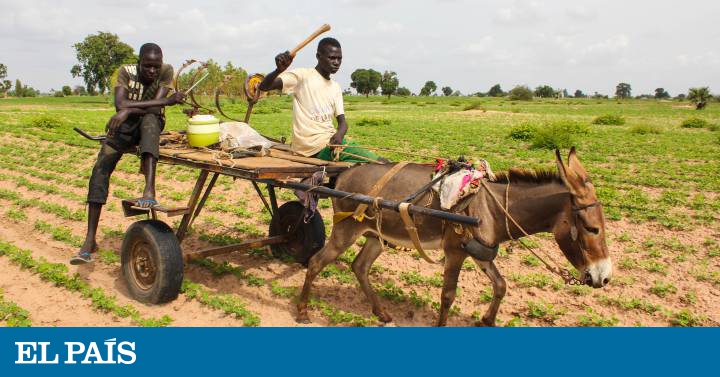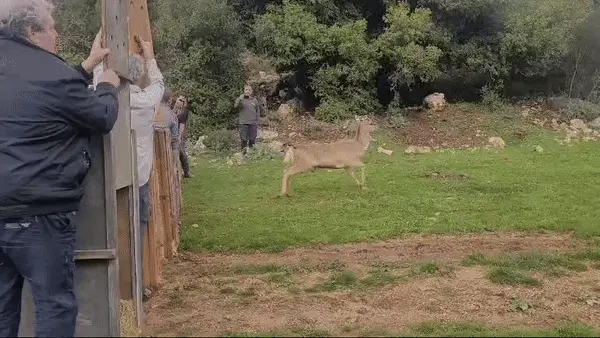Tigers, rhinos, elephants, sharks and pangolins. They are wild animals in danger of extinction because they are trafficked with their skins, their horns, fangs, fins and scales, and whose illegal sale moves billions of euros. There are more than 5,500 species victims of international trade and, among them, there is one less exotic but equally vulnerable: donkeys.
MORE INFORMATION
A band that traded with species in disappearance on demand of millionaire customers falls- Illegal trade is increasingly spreading to threatened species
- The NGO PETA denounces the mistreatment in Petra of camels, horses, donkeys and mules
There are about 50 million copies in the world used for traction and transportation, according to The Donkey Sanctuary, but the Red List of the International Union for the Conservation of Nature has listed the wild donkey as critically endangered. "The species was domesticated about 6,000 years ago, and now domestics are found all over the world, but only a few hundred of their wild ancestors survive," explains the international organization Edge.
It is estimated that 23,200 wild asses remain. "While donkeys do not face extinction in general, the demand for skins is worrying, and their populations are running out," says Nirali Shah, a researcher at the People for the Ethical Treatment of Animals (PETA) organization. Simon Popes, campaign manager of The Donkey Sanctuary, offers as an example the case of a particular breed in Colombia. "After being attacked by thieves in 2018, the local population had to establish a sperm bank to prevent the disappearance of that subspecies of donkeys. In other places, such as Nigeria and South Africa, traders claim that animals are now becoming scarce when they were abundant before, "he explains.
One of the biggest threats that donkeys face is the sale of their skin, specifically to China. There it is used to make ejiao, a jelly made from the boiled dermis to which medicinal properties are attributed: delays aging, increases sexual desire, cures anemia and attenuates the effects of chemotherapy, among other supposed benefits.
China reduced its donkey population by 56% since 1991, according to the UN Food and Agriculture Agency (FAO). The need to import specimens led several countries to open slaughterhouses and export animal derivatives, but this practice has been uncontrolled: it is estimated that the ejiao industry requires about 4.8 million skins per year to keep the demand of its consumers, notes The Donkey Sanctuary in their report Under the skin. With the reduction of the herd in this Asian country, the industry has put unprecedented pressure on populations in other countries. "The demand for skins can make the donkey become the next pangolin," a group of researchers from the Beijing Forest University have concluded.
Most animals come from Africa, a continent that, however, is gradually restricting fur trade. In 2017, five countries around the world opposed him. In 2019, 18 countries, mostly African, had taken action. The first to ban exports of donkeys was Senegal in 2016. They were followed by Burkina Faso and Mali, which in August of that year banned slaughter, and Niger, which did the same with the export of skins, just like Ghana in early 2017. Since then, Gambia, Ethiopia, Tanzania, Botswana, Chad, Uganda, Zimbabwe, Namibia, Sudan, South Sudan and Nigeria have adopted some type of restriction.
On the other hand, international veterinary associations, and even the United Nations, have made appeals in recent years to curb these practices; The online commerce giant Ebay has banned since December 2017 the purchase and sale of ejiao on its platform.
The Kenyan case
The last country to ban the killing of donkeys has been Kenya. At the end of February, the Ministry of Agriculture forced the closure of the four donkey slaughterhouses that operate in the country after numerous farmer protests, dissatisfied with the increasing number of robberies of their animals to be slaughtered, and also due to the complaint of various protectors. Among them was the publication of a video of the PETA organization that shows the mistreatment of these horses in slaughterhouses.
"We want to end this criminality and brutality, and we want to put donkeys back in their right place in our society, which is supporting lifestyles and providing a crucial means of transportation," he later told the Kenyan media. Peter Munya, Minister of Agriculture. In addition to the video published in 2017, PETA and its supporters sent more than 200,000 letters to Munya urging him to end that trade. "The pressure was worth it: Kenya will no longer feed the disgusting ejiao industry," Shah says.
Data collected by the Kenya Agriculture and Livestock Organization (KARLO) have revealed that between April 2016 and December 2018, 301,977 donkeys were slaughtered, 15% of the total, and 2,350 tons were exported. "The projections indicate that in 2023 they will not be left, since more than those born are killed," warn the authors of the research.
Kenya's decision is very significant because it changes the game for world trade in donkey skins, according to Popes. "For the past five years, Kenya has been the main commercial export center in Africa. As the population of specimens has shrunk, merchants have expanded their network to stock up, and during the past year and a half, most donkeys slaughtered came from neighboring countries, such as Ethiopia and Tanzania. In many cases, they had been stolen and illegally trafficked. "
Torture and abuse
The fur trade also usually leads to animal abuse while still alive. They are crammed into trucks when they are transported, sometimes for days, without food or water, so several arrive already dead at the slaughterhouse, or with broken legs, or with infected wounds. Then they will spend days and days locked up waiting for the sacrifice, also in very bad conditions. But since none of this affects the quality of your skin, your care is not encouraged. It has been shown by research such as the aforementioned PETA in Kenya, but there are many more. In a slaughterhouse in Francistown (Botswana), the donkeys dragged from the ears and tail were videotaped. The same happened in another of Shinganya, in Tanzania, where animals were beaten and dragged with chains. In Zimbabwe, a slaughterhouse employee acknowledged that he had found about 25 crushed copies in different shipments when they were unloaded from trucks.
Nor is care taken to apply stunning techniques well when the animal is to be sacrificed, so that the suffering is exponential. And there is also evidence that pregnant donkeys are equally battered. In addition, the unregulated trade of a product that frequently comes from an unsanitary killing increases the risk of transmission of infectious diseases such as anthrax and tetanus.
And in the slaughterhouses of China the situation is not much better. "We have documented that donkey heads are beaten with hammers before their throat is cut. Horses, pigs and cows are also being killed for fake ejiao," Shah denounces.
The alternative, collagen
Kenya's decision is a big blow to the fur trade, but to keep up with the demand, Simon Popes of The Donkey Sanctuary believes that merchants will redouble their efforts to stock up, which may mean they will go to countries to which they have not been directed before or to more remote communities that are even more dependent on donkeys - such as Sudan, Chad, Pakistan - to steal them. "Our efforts are twofold: we will support the communities that are under attack and we will also continue to gather evidence of the impacts of trade through research. We also recognize that there is a trade because there is a demand for the final product in China itself. Future possibilities of being able to have collagen grown in the laboratory, through the so-called cell agriculture process, it would mean that donkeys would not have to be slaughtered for ejiao. We are actively working to defend this alternative. "
In countries where laws have been passed to protect donkeys, it has been proven that they are not followed. In Ghana, for example, slaughter and fur trade was banned in 2017, but a recent investigation by The Donkey Sactuary revealed that the Blue Coast Trading Ltd slaughterhouse, which had been closed, obtained a new license. Similar cases are found in Tanzania and Ivory Coast, where a clandestine slaughterhouse was closed in July 2019. In South Africa, a police investigation revealed that more than double the annual limit allowed by the Government is exported.
The importance of the donkey for a home
Donkeys make the difference between homelessness and subsistence for millions of people, especially in rural areas: they represent a means of transporting people, food and goods, help to complete agricultural work and generate income that goes to pay school fees and toilets, clothes, food ... For women, these are an aid to reduce their daily loads of water and firewood. The charity Brooke has calculated that the net economic value of a working donkey is about 35,000 euros during its 20 years of average life. A skin can be sold for around 115 euros. "This huge difference in money means that millions of euros are extracted from rural economies every year," says his report.
Donkey theft is a problem, first because it leaves its owners without an essential tool to make a living and, second, because the shortage has generated an increase in prices that are not easy to assume. In the case of Kenya, a copy has cost 90 to 180 euros between 2016 and 2019. Although donkey theft decreased in 2018, even so at least 883 copies were stolen from their owners.
For Popes, Kenya has taken this step after checking how trade was inevitably affecting its national herd. "Many other countries have taken preventive measures to protect their populations, but Kenya's action is important because it has recognized the short-term economic benefit of trade for a small number of people (entrepreneurs, slaughterhouse workers, donkey merchants, their own income) in the face of the long-term economic dependence that so many people have on donkeys. "
You can follow PLANETA FUTURO on Twitter and Facebook and Instagram, and subscribe here to our newsletter.





/cloudfront-eu-central-1.images.arcpublishing.com/prisa/BCB6MJLFNJFHTOKKFRCSCPHTFQ.jpg)









